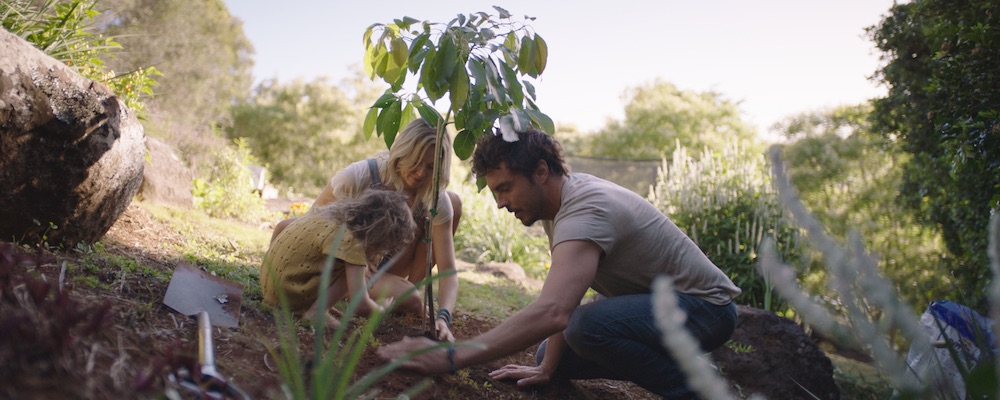‘2040’: Damon Gameau’s Solution-Focused Environmental Doc Offers a Bright Future
Sandra Miska
Damon Gameau‘s documentary “The Sugar Film” impacted legislation and the diets of many in his native Australia, now the filmmaker and actor has followed up with an even more ambitious film. In his latest documentary “2040,” Gameau sets out to seek solutions to environmental concerns, and the result is a vibrant, hopeful portrait of what the world could be in just two short decades.
“2040” is framed as a letter to Gameau’s daughter Velvet, who was only two years old when he started the project. Like many parents, he was frightened by the dire predictions being made about the future of our planet, which compelled him to research solutions to climate change and other environmental problems. What he discovered led him to make a documentary shedding light on existing technologies that, if implemented worldwide, could halt the progression of climate change and reverse some of the damage already done.
“The more I found, the more I thought people need to know about these things, and we need to amplify this narrative right alongside the dystopian one, because otherwise people are going to just disengage and feel paralyzed and hopeless,” he explained. “I just wanted to contribute something different to this topic.”
Showing is better than telling, so Gameau and his crew set off on a trip around the world to see these technologies firsthand. His first stop was in a developing country, Bangladesh, where a solar-powered microgrid system powers a whole community. In New York, he finds himself riding in a self-driving car, and we learn how adapting a system in which cars are available on demand, instead of owned by individuals, would not only greatly reduce air pollution, but also free up space currently being used for parking. Other solutions explored are regenerative farming, a concept that involves growing a diversity of plants and letting livestock graze, and marine permaculture, which entails farming seaweed in the ocean in order to counteract climate change and other issues (apparently seaweed has a multitude of benefits).
When narrowing down what technologies he wanted to explore in “2040,” Gameau picked those that had benefits beyond stopping climate change. “They couldn’t be a silver bullet or just take carbon out of the atmosphere, for example. They had to have cascading benefits for society or communities or animals or just well-being. You think of something like the microgrids in Bangladesh; apart from bringing solar energy, they also decentralize that ownership that keeps the money in the community, which addresses the income and inequality problem, as well.”
While the premise of “2040” may seem overly optimistic to some, Gameau manages to make saving the world look, if not super easy, at least not impossible. “It’s just the political will that we’re lacking and getting the vested interest out of the way, but we actually can do it, which was really reassuring. In terms of solutions, the two surprises were the wonder of seaweed and just how little we know about it right now and yet how dramatic it could be in terms of having an impact on our oceans and the climate.”
Gameau also found himself surprised to learn the role the education of girls plays in improving environmental conditions, as empowered women are not only likely to make informed choices, they are also more likely to wait longer to start families and have less children, thus consuming less resources. “That was a shock to me. Living the life that we do in Australia, we take for granted that my daughter is going to finish school and have that opportunity.”
“2040” is interwoven with the fictional story of Velvet as a young woman in 2040. The world she lives in is the ideal universe that could exist if we implemented the solutions presented, and it’s quite inspiring, and even at times breathtaking, to witness what is possible. Gameau revealed that he and his team spent the bulk of their time bringing to life the futuristic scenes.
“If we were going to sell this vision of a better future, I really wanted to make sure the VFX were of a high standard and that they excited people, especially the kids. They’re pretty savvy these days. If the VFX had been too hokey or unbelievable, then I don’t think the film would have resonated as well as it did in Australia.”
Since completing “2040,” Gameau, along with his wife, Zoe, has already made multiple changes in his own household, including selling his car, installing solar panels, and growing much of his own food. The doc has already greatly impacted Australia since its release there last year. According to Gameau, teachers have been making use of the resources on the “2040” website, which has been integrated into the curriculum of a million students. And that’s not all.
“We’re building that seaweed platform down in Tasmania now. It’s the first one in the world that we’re building. Our farmers have been helped, girls have been educated, microgrids are being built. This is just from people giving $10-15 donations after seeing the film and feeling motivated after being hopeless… I think it’s strong evidence that this solution-focused storytelling is the way to go, instead of scaring people.”
“2040” premieres June 5 on Virtual Cinema.

